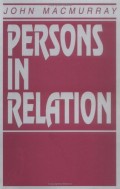Persons in Relation (Vol. II of ‘The Form of the Personal’)
A Summary by Michael Edwards
Click here to read, at archive.org
Working Copy: 1962 reprint of 1961 first edition published by Faber. 235 pp, 10 Chapters + Index.
(An edition with a new introduction by Frank G. Kirkpatrick was published by Humanities Press, U.S.A., 1991, and by Faber, 1995, œ8.99.)
Introductory
1. The Field of the Personal
2. Mother and Child
3. The Discrimination of the Other
4. The Rhythm of Withdrawal and Return
5. Morality and its Modes
6. Community and Society
7. The Celebration of Communion
8. Reflection and the Future
9. The Devices of Politics
10. The Personal Universe
Index
Macmurray had a double criticism of traditional Western philosophy: that it viewed things from the theoretical standpoint, and that it was egocentric. The first volume of ‘The Form of the Personal’ was devoted mainly to dealing with the first criticism. In it he made a convincing case for a ‘Copernican shift’ in ‘the centre of gravity of Western philosophy’ from commencing philosophical analysis from the standpoint of the ‘self as thinker’ to the standpoint of the ‘self as agent’. But, as Macmurray himself conceded, he hadn’t fully dealt with the first criticism, hadn’t removed all the bugs by the end of the first volume because this newly elevated ‘Self as Agent’ was still, in conception, rather isolated. And an isolated agent is a self-contradiction. An agent requires relationship with the Other as resistance and support to his actions in order to be able to do anything i.e. in order to be an agent. (Without the resistance and support of the ground I cannot walk.) So this second volume does deal with the second criticism of traditional Western philosophy (i.e. that it is egocentric) but in doing so gathers up the loose ends left hanging from the first volume. It seeks to demonstrate the Self as an agent constituted by his relationship to the Other; and as a person constituted by his mutual relationships with other persons.
There is a view that Macmurray presented his criticism of traditional Western philosophy in the sequence that he did because he was a professional philosopher trying to convince other professional philosophers. And that he felt he wouldn’t get a hearing if he didn’t present something which would hang on pre-existing philosophical hooks. But, continues this view, this gives the long argument maintained through the two volumes a somewhat awkward structure, especially to the intelligent layman who often has more activist interests and who does not carry the baggage of professional philosophical preconceptions. It is suggested that Macmurray would have made himself more accessible to these people by straightaway jumping into the deep end of philosophically addressing the experience of members of a community of embodied personal agents and taking it from there. There may be something in this. I, personally, don’t have too much difficulty with the argument as presented. But for those that do, it may be worth their while considering that the package could perhaps be differently assembled. The argument may not have to follow the sequence here given to it.
Macmurray is concerned to scotch the idea that a person starts life merely as an organic mass, a bawling little animal, which has to be converted into a person by stern and rigorous discipline and education. He maintains that, on the contrary, an infant’s life is a personal one from birth.
The first chapter is a general discussion of the field of the personal which, incidentally, contains a very good characterisation of the difference between treating people personally and treating them scientifically; and an elucidation of the bearing of this upon the free will/determinism antimony. But after this, in accordance with his view that the human life is a personal one from birth, he pauses for a consideration of the Mother and Child. He seeks to demonstrate that the baby is not merely an animal organism but a person, a rational being. His life and bodily survival depend on intentional activity and therefore knowledge. His own intentional activity is necessarily limited in the early days and has to be supplemented by that of the mother with whom he is in communication. He lives by communication. A reader may reasonably wonder how Macmurray knows some of the empirical things he asserts in this chapter, was it by his own observation, intuition and common sense together with the results of conversations with and reading of colleagues in the relevant fields? For the most part he doesn’t tell us. We can only surmise. (One recent researcher, Colwyn Trevarthen of Edinburgh University, thinks that Macmurray underestimated the range of communication skills that the baby has at its disposal early in life.)
Throughout the rest of the book Macmurray elaborates the development of a person’s relationship with the personal Other and shows how ever more complex discriminations are made. He shows how the possibility comes about for the occurrence of such things as direct and indirect relations, personal and impersonal relations, community and society. He deals with both the positive and negative aspects of these phenomena. A glance at the Contents page will give some indication of the field covered. He ends with a vindication of the rationality of belief in God and the conclusion that philosophy is theology which has abandoned dogmatism and become in a new and wider sense a Natural Theology.
